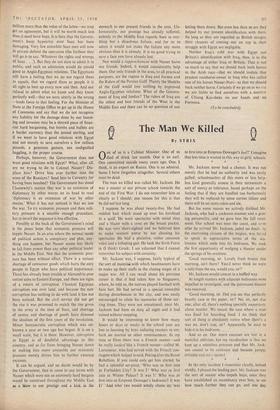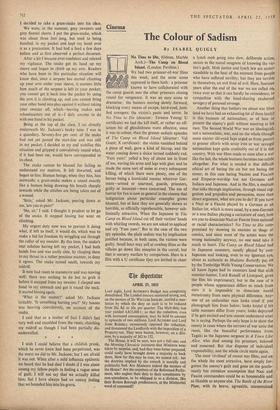The Man We Killed
By STRIX ONE of us is a Cabinet Minister. One of us died of drink last month. One is an earl. One committed suicide many years ago. One, 1 think, is an expert on Russia. One is an admiral. Some I have forgotten altogether. Several others must be dead.
The man we killed was called Mr. Jackson. He was a master at our private school towards the end of the First War. I do not remember him as clearly as I should; one reason for this is that he did not last long.
I suppose he was about twenty-five. He had reddish hair which stood up over his forehead in a quiff. He wore spectacles with metal rims and a blazer with 'a crest on the breast pocket. He was very short-sighted and we believed him to make matters worse by not cleaning his spectacles. He had a plaintive, rather common voice and a lolloping gait. He took the Sixth Form in (I think) Greek; I am ashamed that I cannot remember his subject with certainty.
Mr. Jackson was, I suppose, fairly typical of the sort of material with which headmasters have to make up their staffs in the closing stages of a major war. All I can recall about his previous career is that it had taken him to Singapore, where, he told us, the natives played football with bare feet. He had served as a special constable during disturbances in the city, and was easily encouraged to relate his memories of those stir- ring times. They were not sensational; once Mr. Jackson had been on duty all night and it had rained without stopping.
It would be interesting to know how many hours or days or weeks in the school year are lost to learning by boys inducing masters to em- bark on martial or other reminiscences. In my time at Eton there was a French master—and he really looked like a French master—called M. Larsonnier, Who had served with the French con- tingent which helped to sack Peking after the Boxer Rebellion. If you could only get him started, he had a splendid set-piece. 'Who was ze first into ze Forbidden City? It was I ! Who was ze first into ze Winter Palace? It was 1! Who was ze first into ze Empress Dowager's bedroom? It was II"And who' (we would wittily chime in) 'was ze first into ze Empress Dowager's bed?' I imagine that less time is wasted in this way at girls' schools.
Mr. Jackson never had a chance. It was not merely that he had no authority and was easily gulled; schoolmasters of this more or less help- less kind generally arouse in their tormentors a sort of mercy or tolerance, based perhaps on the feeling that if they are handled too barbarously they will be replaced by some sterner fellow and there will be no more cakes and ale.
But for some reason we actively disliked Mr. Jackson, who had a cocksure manner and a grat- ing personality, and we gave him the full treat- ment. Our school was near the coast, and soon after he arrived Mr. Jackson, jaded no doub. by the enervating climate of the tropics, was herd to speak in appreciative terms of the sea- breezes which stole into his bedroom. We took the first opportunity of wedging a bloater under the springs of his mattress.
'Good morning, sir. Lovely fresh breeze this morning, isn't there? You'd never think we were a mile from the sea, would you, sir?'
M r. Jackson would concur in a baffled way.
At length masters with adjacent bedrooms were impelled to investigate, and the putrescent bloater was removed.
'Good morning, sir. Did you see that perfectly beastly case in the paper, sir? No, sir, not that one; after all, there's nothing specially unpatriotic about murder. We meant the case where a man was fined for hoarding food. I do think that sort of thing is• absolutely rotten when there's a war on, don't you, sir? Apparently he used to hide it in his bedroom. . .
And so on. Our worst excesses are lost in a meeciful oblivion, but my recollection is that we kept up a relentless pressure and that Mr. Jack- son ceased to be cocksure, and became jtimpy, irritable and maladjusted.
In the only incident 1 remember clearly, indeed vividly, I played the leading part. Mr. Jackson was the sort of master who impels boys, once they have established an ascendancy over him, to see how much further they can go, and one day I decided to take a grass-snake into his class.
We wore, in the summer, grey sweaters and grey flannel shorts. I put the grass-snake, which was about three feet long, but used to being handled, in my pocket and kept my hand over it as a precaution. It had had a feed a few days before and at first observed a perfect decorum.
After a bit I became over-confident and relaxed my vigilance. The snake got its head up my sleeve and began to climb up my arm. Readers who have been in this particular situation will know that, once a, serpent has started climbing up your arm under your sleeve, it matters little how much of the serpent is left in your pocket; you cannot get it back into the pocket by using the arm it is climbing up, and you cannot bring your other hand into play against it without taking your sweater off, which—leaving snakes and schoolmasters out of it—I defy anyone to do with one hand in his pocket.
Being at the top of the class, I sat directly underneath Mr. Jackson's beaky nose. I was in a quandary. Seventy-five per cent. of the snake had not yet passed the start-line and was still in my pocket. I decided to try and stabilise this situation and gripped it convulsively round what, if it had been me, would have corresponded to its chest.
The snake cannot be blamed for failing to understand my motives. It felt thwarted, and began to hiss. Human beings, when they hiss, hiss outwards; a grass-snake makes a sound exactly like a human being drawing his breath sharply inwards while the stitches are being taken out of a wound.
`Strix,' asked Mr. Jackson, peering down at me, 'are you in pain?'
`No, sir,' I said. I thought it prudent to let go of the snake. It stopped hissing but went on climbing.
My urgent duty now was to prevent it doing what, if left to itself, it would do, which was to make a bid for freedoin by wriggling out through the collar of my sweater. By this time, the snake's rear echelon having left my pocket, I had both hands free and was easily able, by clasping them to my throat in a rather precious manner, to deny it egress. The snake turned south, towards my midriff.
It now had room to manoeuvre and was moving well; there was nothing to do but to grab it before it escaped from my sweater. I clasped one hand to my stomach and got it round the neck. It started hissing again.
'What is the matter?' asked Mr. Jackson irritably. 'Is something hurting you?' My bosom was heaving convulsively, on account of the snake.
I said that as a matter of fact I didn't feel very well and stumbled from the room, clutching my midriff as though I had been partially dis- embowelled.
I wish I could believe that a childish prank, which he never knew had been perpetrated, was the worst we did to Mr. Jackson; but I am afraid it was not. When after a mild influenza epidemic we heard that he had died I doubt if I was alone among my fellow-pupils in feeling a vague sense of guilt. I will not say that we actually killed him; but I have always had an uneasy feeling that we hounded him into his grave.















































 Previous page
Previous page